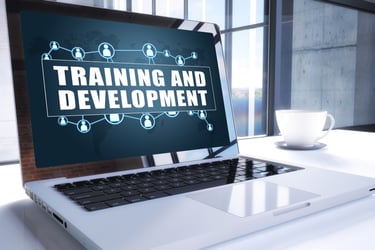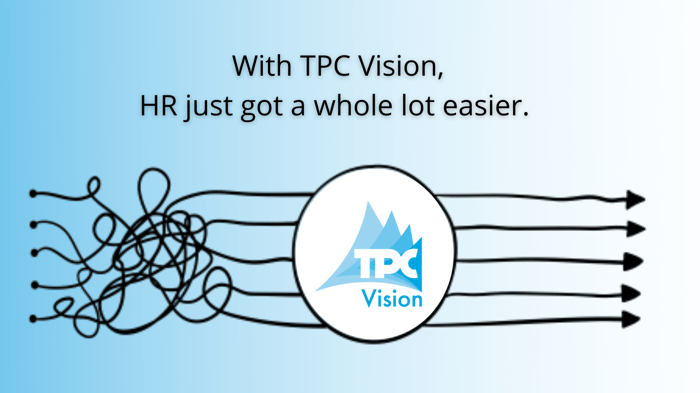According to an annual survey by Human Resource Executive, a whopping 90% of human resources professionals say their stress has increased in the last year—47% of whom say their stress levels have increased “dramatically.”

When you add in the challenge of a pandemic, the complexity of an at-home workforce, increased regulation and compliance requirements, plus the challenge of finding and retaining quality employees...the job can be overwhelming.
We understand. That's why we've developed a comprehensive solution for businesses.
HIRE - MANAGE - GROW
HR management is about more than just recruiting and hiring.
Hiring the right people to fill open positions is an important part of HR, but it's just a part - one piece of a very important and complex puzzle. The rest of HR management involves developing systems so that a company can more easily manage employees and help them grow. You've heard it said that a company can only be as successful as its employees. For that reason, a smooth and efficient HR system is a critical part of a business's overall plan for growth.
This guide will help you understand the various elements needed for a successful Human Capital Management System for your company. The goal is to help you become a better company through better HR systems and better employees. And if you choose to outsource, we're there for you with TPC Vision, our fractional HR partnership with a proprietary portfolio of comprehensive HR advisory services.
Naturally, we get a lot of questions about outsourcing HR Advisory Services:
What are the benefits of outsourcing my HR? Will I be able to maintain control of my employees? How will I know if outsourcing HR is the right fit for my company? What's the difference between different HR companies? What exactly is HR Advisory Services? Get the answers to these questions and more in our HR Advisory Services FAQ section.
The goal of this page is to provide you with answers and quality information to be able to make the best decision for your company.
Note: Strategically placed throughout this page, you'll also find HR quick links ![]() to additional TPC resources related to each of the 12 critical areas of HR advisory support.
to additional TPC resources related to each of the 12 critical areas of HR advisory support.
The importance of having an HR Management System
We've identified 12 key areas that a successful HR management system includes as part of its overall strategy. Missing or broken links in the system can cause problems in other parts of the system and damage a company's entire ecosystem. For example, misleading or incomplete job descriptions affect a recruiter's ability to hire the right candidate for a job. A poor hire can affect performance reviews for that person because they likely have different expectations from their supervisor for the tasks required to successfully perform in that position. A now frustrated employee can jeopardize company morale and is more likely to quit - affecting other employees who were depending on that person for their job performance. Company culture ultimately suffers.
Each of these 12 areas is intimately connected to the others. Trouble in one area will likely affect another area negatively. Conversely, when each area is set up for success, a business is in a healthier internal position to thrive. Bumps along the road are inevitable, but a strong HCM system can navigate problem areas more successfully.
Each of these areas is important to a healthy HR department, but are also areas that a quality HR Advisory Services Provider will offer.
 Further down this page, we expand on each category with important information, assessment questions, and additional resources to assess your business's current level of HR success and to determine if outsourcing is right for you.
Further down this page, we expand on each category with important information, assessment questions, and additional resources to assess your business's current level of HR success and to determine if outsourcing is right for you.
You can click on any link below to jump to that category, or simply keep scrolling to see them all. You can also download our free resource guide, Proactively Managing Your HR, to your desktop for your own copy.
Many people still think of an HR payroll company strictly in terms of payroll and compliance.
But as you will see, TPC's HR Advisory Services - called TPC Vision - is a whole lot more.
12 Key Areas for successful HR management
Select any area below to learn more:1. Job Descriptions
Job descriptions are foundational to your recruitment plan. They are important, not just for applicants to know what's expected in a job opening, but for your company as well. The process of clarifying a job's expectations can be valuable insight for a business. They provide a baseline that will ultimately attract the right kinds of candidates, drive performance metrics, guide training and development, ensure job satisfaction, and help avoid the termination of employees due to misaligned expectations.

Job descriptions are never a "one-and-done" task. As companies grow, technology evolves, and expectations change...your job descriptions should be reviewed regularly and updated to accommodate any needed modifications.
Furthermore, a business will need to determine the type of employee they are looking for (full-time, part-time, temporary, independent contractor, work from home, etc), pay ranges, skills requirements, and more. All this information needs to be clearly outlined in the job description so as to make sure applicants fit the needed criteria. Legally, clear job descriptions also provide needed clarity on FLSA requirements (Fair Labor Standards Act).
2. Employee Recruiting
The job market may fluctuate year-to-year, but it’s important to always put your best efforts to work when formulating hiring and recruiting strategies in order to acquire the best and most suitable talent for your company.
To create a successful and comprehensive recruiting strategy, you'll want to begin by considering the following key areas. To read a complete list of employee recruitment tactics, download our ebook "Recruitment Strategies That Work."
Set Campaign Goals
With so many ways to advertise your job openings, you'll want to measure which ones work and which ones didn't. Start by charting your goals and tracking key metrics for your campaign.Create Specific Job Descriptions
As we mentioned in the point above, job descriptions are foundational to your recruitment marketing efforts. Well-written job descriptions will attract the right candidates just like poorly written job descriptions will turn them away.
Perfect Your Job Advertisements
With a defined description of your ideal candidate, the perfect job advertisement has a detailed job description, company overview, and a list of all traditional and nontraditional benefits the company has to offer. HR teams that add creativity to these advertisements while portraying the culture and values of the company have the most success.
Implement an Employee Referral Program
Employee referral programs can be very effective when a business is looking for new hires. Current employees tend to make the best recruiters. After all, no one knows better what it takes to succeed and thrive in an existing company culture better than the people who currently work there. Employee referral programs not only motivate new and existing employees to assist in recruitment efforts but help in finding talent who aren't in the market for a new job but may consider it if the recommendation comes from a friend.
Offer Out-of-the-Box Employee Benefits 
Companies that go beyond the norm for their employee benefits packages help attract and retain amazing talent while positively transforming the company culture. Having these types of benefits also helps companies avoid the additional costs of having to train new employees because of high turnover. Companies who understand the power of a rapidly evolving workplace will reap the benefits.
Make Diversity and Inclusion a Top Priority
When attracting top-tier candidates, it’s important to be inclusive to everyone regardless of race, gender, sexual orientation, or disability. Companies that have norms in place that hinder the progression of inclusivity often miss their chance at acquiring or retaining top talent. For most people, these are deal-breakers.
Offer Competitive Compensation
Compensation is a huge factor in getting employees to come on board and remain loyal. It’s important to have market comparisons for the same role elsewhere and determine the value of the position to create an acceptable wage range. Calculate the median wage for the position to make sure what your company is offering is competitive enough to attract top talent.
The market is fickle and employees can be lured away by better offers. Keeping your salaries competitive and offering the best benefits and incentives with a strong company culture will keep employees happy and prospects interested.
3. Onboarding New Employees
Attention to onboarding can mean the difference between setting them up for success from their very first day and having them feel like they are a welcomed part of the team...to making a poor first impression and leaving a bad taste from the very beginning. Employees are too valuable...especially one that you've just spent time and money finding, vetting, and hiring. A proper onboarding plan will make sure they are set up for success.

The key to an effective onboarding plan is just that...having a plan. Don't wait until the day before they start to suddenly remember you have a new employee walking into the office in the morning.
We suggest planning their first two weeks on the job. The schedule may include things like finalizing any paperwork needed to complete the hire, a tour of the office, introductions to staff members, appointments with key personnel in various departments, training sessions, etc. Meet them at their desk with things like a welcome sign, a small gift, an outfitted desk, and business cards printed and ready. Their supervisor should carve out a 10-minute huddle with them at the beginning and end of each day - time set aside for asking questions, reviewing the day's goals, and discussing their experience.
Remember how you felt your first day in a new job?! It's exciting but also unsettling and awkward. Carefully planning their critical first few weeks and warmly welcoming your new employee will reinforce your company philosophies, help them feel like a valued member of the team, and set them up for long-term success.
 Onboarding Resources:
Onboarding Resources:
4. Performance Management
Regular feedback is important to an employee's success. Too often, employees receive little or no feedback on how they are performing. This leads to misplaced expectations and surprise terminations or resignations.

Performance reviews should be held regularly so that an employee can clearly understand how they are doing against standards discussed in previous meetings. They provide an open forum for 2-way conversation where both an employee and a supervisor are able to discuss likes, dislikes, areas for improvement and advancement, and the pathway for raises or promotions.
There are many mistakes that we see people make in their performance reviews. Some of the biggest mistakes include reviews that are not frequent enough, not giving enough praise or recognition when a job is well done, a lack of measurable standards, conversations that are too vague, avoiding negative feedback, and no follow-through after a performance improvement plan has been put into place.
Nobody likes to hear negative feedback, but almost everybody wants to succeed. Having a plan for regular performance reviews helps both the supervisor and the employee feel more confident, keep communication open, and have a clear plan for success.
 Performance Management Resources:
Performance Management Resources:
5. Compensation
Compensation management is a specialized HR discipline that involves the planning, development and implementation of monetary (e.g., wages) and non-monetary (e.g., benefits) pay strategies. The goal is to enact consistent policies that promote equitable compensation while helping the organization reach its strategic aims.
The goal of compensation management is to attract and hire quality people and then pay them in a manner that improves retention. Compensation management seeks to:
- Find competent people to fulfill the organization’s objectives.
- Foster a satisfied and productive workforce.
- Reduce turnover rates.
- Motivate employees to accomplish their career goals.
- Establish realistic and achievable standards for performance evaluations.
- Boost morale by rewarding employees for their achievements.
- Adopt pay equity standards to reduce employee grievances.
- Create suitable pay structures for determining compensation.
- Comply with legal requirements.
- Develop compensation strategies to attain a competitive edge.
- Facilitate a payroll system to deliver employee compensation.
These tasks are different from, but should dovetail with, standard payroll functions:
- Tracking nonexempt employees’ time worked.
- Ensuring nonexempt employees are paid according to their timekeeping data.
- Paying wages and salaries due, including overtime, pay increases, and incentive pay.
- Administering employee benefits as they relate to payroll.
- Deducting mandatory and voluntary deductions from employees’ pay.
- Reporting wages and deductions to government agencies.
- Adhering to payroll laws, including for taxes and recordkeeping.
- Paying employees accurately and on time.
With employees putting so much stock into pay and benefits, employers are feeling the pressure to make compensation management a priority. But if the system is manually intensive, it can make the process tedious and error-ridden, which goes against the core objective of compensation management — that is, to develop sound compensation policies and strategies.
Compensation management software offers an efficient solution for managing employee rewards. For best results, the software should have the following features:
- Workflow automation.
- Compensation planning support.
- Compensation data to help you make informed decisions.
- Real-time reporting.
- Compliance assistance.
- Scalability.
- Integration capability.
6. Employee Agreements
Employee Agreements are the signed contracts between a company and an employee that clearly define the terms and conditions for employment. Employee agreements give both the business and the employee security in knowing that all employment obligations are clearly defined. This protects both the employee and the business and can be especially important if either party believes that a violation has occurred.

Employee agreements are frequently used in both standard employment contracts as well as for specialized situations. For example, in a highly competitive recruiting environment, it's not uncommon for companies to make promises in terms of benefits, job perks to try and recruit high-quality employees. In these specialized situations, employee contracts should be drawn up that outline the terms of employment and any promises made so that there won't be any discrepancies down the road. Other more standard employee agreements include non-compete agreements, non-solicitation and confidentiality agreements, telecommuting agreements, work-from-home agreements, and more.
There are legal ramifications to your employee agreements, so we recommend working with a professional HR expert and your company attorney to appropriately draft the right documents for your business.
Our dedicated HR team answers these questions on a daily basis and assists companies with crafting the agreements appropriate for their unique business situation - so if you have any questions, call us. We'll be able to get you pointed in the right direction.
7. Employee Training & Development
There’s an old joke about an executive who worries that training their employees will be a bad investment because they might leave, to which the sage CEO says, “What if we don’t train them and they stay?” Contrary to common fears, training employees doesn’t usher them out the door. Yes, training may prepare employees for employment outside your company, but it also prepares them for a better future working for you.

Aside from developing practical skills and knowledge among employees that will contribute to your bottom line, training can be a way of building good professional relationships. This goes for both team training and individual training. Training shows you trust your employees and that you’re committed to their career growth. Be upfront about this. Tell them that you hope the training you provide to them gives them more opportunities within your organization, but also more opportunities in their overall career development and growth. Then involve them as much as you can in the future of your organization. They’ll be more likely to stay if they believe they have a place as your company grows, overcomes challenges, and prospers.
When your employees expand their knowledge, skills, and abilities, they’ll do better work. When they do better work, they’ll better the company. Morale will increase as their passion and excitement grow and as the company performs better.
8. Employee Relations & Company Culture
Does your company have a culture? Yes. Does it matter that you are a sole proprietor? No. Every company, no matter how big or how small, has a culture...the only question is whether it is helping your company's growth or hindering it. It's important to understand that culture is defined by a number of aspects, including leadership and employee behaviors. Once you understand what it is, you can take steps toward creating the one you want.

Company culture is not something that employees bring with them. Rather it is a pre-existing condition — one that can be brought to good health if it’s not already there.
Company culture isn’t one-size-fits-all. Every company has a unique personality and presence, but it should be one that makes all employees feel valued, successful and part of a team. Culture affects morale, and morale affects retention. Culture starts at the top of an organization and works its way down through to all levels. The actions of a company's leadership team set the tone for how a company culture will be determined, regardless of what is written in its mission and values. Leadership needs to communicate and act in a manner consistent with written statements, making written values believable by all employees.
9. Workplace Safety
Safety is a basic human need. Employees accept a position with an implied level of trust for the company that measures are taken to keep them safe on the job. There is a lot involved with meeting and maintaining safety standards in a company. OSHA requires recordkeeping, communication with employees, safety protocols, and more. Prioritizing workplace safety is about keeping employees healthy and safe, and it's also about staying in compliance with government and legal requirements.

We find that many of our business clients appreciate the help in making sure they stay compliant. They depend on us as a valuable resource before, during, and after an event occurs. We assist with general guidance, we offer resources and assistance with incident reporting & maintaining OSHA logs.
It's important to remember that OSHA doesn't exist to make life difficult for your business. It's part of a critical checks-and-balances system protecting both your company and your employees in the prevention of accidents. Then if an accident occurs, they  will provide valuable assistance during an investigation and afterward as protocols are reviewed to make sure a repeat incident is prevented. For the well-being of both your employees and your business...be sure to stay in compliance.
will provide valuable assistance during an investigation and afterward as protocols are reviewed to make sure a repeat incident is prevented. For the well-being of both your employees and your business...be sure to stay in compliance.
10. Off-boarding Employees
Everyone wants employees to stay...especially good employees. You've invested in them...recruiting, interviewing, hiring, onboarding, and training them. But sometimes it doesn't work out. When that happens, it's key to stay professional and implement a plan to make that transition as smooth and seamless as possible. Failure to do so can demoralize existing employees and can open you up to litigation.

Terminating a poor employee or accepting a good employee's resignation can be emotional for everyone. That's why it's even more important than ever to have a plan in place and not leave the transition to a potentially emotionally-charged process. Successful off-boarding employees is a system of exit interviews, forms, checklists and surveys, potential severance agreements, and more. Where there are layoffs, PR should be considered and the process should be handled with care and respect. A quality HR Managed Services partner will provide consulting through potentially tenuous circumstances to set both parties up for the best possible outcome.
11. HR Compliance
Business owners and managers are often busy to the point that they overlook the importance of compliance training. Such training is essential for employees as well as the business as a whole. In short, if you manage or own a business, it is important that you implement compliance training.
 Ongoing compliance training boosts employee development and also safeguards your company against potential legal hurdles down the line. Invest the time, money, and energy necessary to train your employees so they become that much more knowledgeable about relevant regulations. Knowledgeable employees will help ensure your business faces fewer lawsuits or is hit with fewer penalties.
Ongoing compliance training boosts employee development and also safeguards your company against potential legal hurdles down the line. Invest the time, money, and energy necessary to train your employees so they become that much more knowledgeable about relevant regulations. Knowledgeable employees will help ensure your business faces fewer lawsuits or is hit with fewer penalties.
The specific type of compliance training performed at your office hinges on the size of your business as well as your unique field. The different types of employee training include:
- HR/Employment Law Compliance: Your Human Resources specialists must be in full compliance with the subtleties of employment law.
- HIPAA Compliance: Patients’ medical information must be kept private. If your business is in the medical industry or involves handling patient medical information, your team should be trained to understand the detailed rules of HIPPA.
- Safety/OSHA Compliance: Chances are your team does not understand the nuances of OSHA compliance. These rules were put in place to ensure employee health and safety is prioritized. Provide compliance training regarding OSHA compliance and your employees will prove that much safer at work.
Remember - compliance isn't something to be taken lightly or disregarded. TPC Vision has the tools, resources, and expertise necessary for keeping your business out of trouble and running smoothly.
12. A Dedicated HR Expert
One frustration we hear consistently from businesses before they began working with TPC Vision, is that they had nowhere to go for regular HR questions, help, and resources. Each business is unique, and it takes someone who will stay with you over the long haul - who knows your name, your business, your strengths, and challenges. Bottom line, it takes a relationship.
 For that reason, we pair you with a dedicated HR representative. If any issues arise among your team members, "your person" will be there to provide insight and make sure you’re in full compliance with existing laws every step of the way. TPC’s engagement and satisfaction benchmarks will help you navigate your relationship with employees starting the moment you have an opening.
For that reason, we pair you with a dedicated HR representative. If any issues arise among your team members, "your person" will be there to provide insight and make sure you’re in full compliance with existing laws every step of the way. TPC’s engagement and satisfaction benchmarks will help you navigate your relationship with employees starting the moment you have an opening.
Our TPC Vision team members become your personal HR concierge, available at any time to help you navigate the hurdles in a constantly changing business world. In fact, of all the tools and resources we offer, clients tell us that their relationship with the TPC Vision team liaison is the most valuable of all of them.
Hire
TPC's HR Solution provides:
- Job Descriptions & Classification Testing
- Hire Recruiting & Applicant Tracking
- Paperless Employee Onboarding
- Performance Management
- Annual Reviews & Updates
- Employment Agreements
- Training & Developent
- Employee Relations & Culture
- Workplace Safety
- Offboarding
- New Hire Reporting
- Tax Credit Filing
Manage
Collect and maintain employee information such as:
- Emergency Contacts
- Form I-9, EEO and Veteran Status
- Job and Salary History
- Performance Reviews
- Prior Employment
- Education History
- Employee Skills Assessment
- Employee Awards & Recognitions
- Training and Job Certification
- Company Assets
- Disciplinary Actions
Grow
Customize details around your unique business:
- Multi-Level Workflow for Transactional Approval
- Ability to Define Conditional Workflow Criteria
- Custom Fields
Take the headache out of EEO, OSHSA, and other reporting processes by generating accurate compliance reports in a timely manner. Place your confidence in TPC, and your data will be secure.
For your HR team to be successful, you need a partner with a solution that works quickly, quietly, and efficiently. TPC’s HR solutions give you that workforce edge by seamlessly integrating everything from hire to retire – and all that happens in between. Contact us today to speak with one of our HR experts about whether or not TPC's Advisory Services is right for your business.
HR Advisory Services FAQ
Q1. What exactly is HR Advisory Services?
HR Advisory Services is a service we provide that offers overall HR Support and Guidance so you can focus on your people. For your team to be successful, TPC’s HR advisory services give you that workforce edge by seamlessly integrating everything from hire to retire – and all that happens in between - all in one place. It’s a good mix of Tech and HR Experts that support you and your growing Team!
Q2. What are the benefits of outsourcing my HR?
The benefits of partnering with an HR Advisory Services provider are many.
Here are a few we've heard clients share with us:
-
You have an HR expert you can call.
-
Our clients sleep better at night knowing they have an HR team to support them with any employee issue.
-
Stop Googling for HR answers and call or e-mail our team for directions.
-
Multi-state - no problem!
-
Confidently stay in legal compliance.
-
Recruit, cultivate, and manage a thriving team.
-
Save time.
-
Paying for our services is often more affordable than hiring full-time HR.
-
Be proactive and not reactive.
-
Gain more automation with a human touch.
-
Take Your HR department from tactical to proactively strategic.
Q3. Will I be able to maintain control of my employees?
Absolutely. You never lose control of your employees. Your TPC Vision representative is there for you as an ongoing resource to guide, offer feedback, and answer questions. We'll coach and train to help you leverage all the resources you'll have available through your partnership with TPC Vision.
Q4. How will I know if outsourcing HR is the right fit for my company?
The only way to know for sure is to talk with one of our HR experts. We have a wide range of experience with all different sizes of businesses in a wide variety of industries. We can share what we've learned in working with businesses like yours and answer any questions you may have.
Q5. Why should I choose HR Advisory Services with TPC?
TPC Vision was started in response to client demand and the rigors of a constantly changing Labor and HR climate. Over the years, our clients needed and expected more. We carefully analyzed the HR services industry and identified gaps in the market. Many businesses didn’t have a dedicated HR role and just stuck the “HR Title” on someone as a promotion. But in many instances, that person really has little to no HR Experience. We have identified this gap and are able to bring HR structure, policies, procedures, and processes to a business to help protect the owner and their employees.
Q6. How do I get started?
Simply let us know you'd like to talk with someone from our team about how TPC Vision services can work with your business. To do that, simply fill out this form. One of our HR experts will be in touch to meet you and discuss the right fit for your business. Give us an opportunity to learn more about your business. We promise, we won’t bite, and you’ll probably be surprised!










